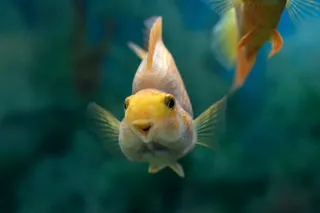After three decades of stalking fruit flies in the wild, Therese Markow has honed her technique to a fine art. Her weapon is a long glass tube with a gauze trap in the center. "You sneak up on the flies and suck," she says. "Then you blow them out into a vial."
Most folks would just grab a flyswatter. But Markow is charged with keeping fruit flies alive and thriving—not the dozen or so that might hover over a black banana on the kitchen counter but the thousands, maybe even millions, housed at the National Drosophila Species Stock Center at the University of Arizona in Tucson. As the center's director, Markow presides over an invaluable scientific resource: a collection of some 270 species and 1,500 strains from the family Drosophilidae. Fruit flies are the preferred pet of scientists studying topics from alcohol intolerance to the origin of species. Markow's flies were culled from their native habitats around the world, and more than 1,000 orders are shipped out each year to equally far-flung laboratories. For $20 to $75 a pop, researchers can procure by express mail a sample of the living descendants of, say, one Samoaia leonensis collected from Afiamalu Road in Upolu, Western Samoa, on July 22, 1967.
"There are actually a lot of important issues addressed by flies," says Markow, who is also a professor of ecology and evolutionary biology at the university. "It's not just a bunch of bugs."
A century ago fruit flies were just a bunch of bugs, albeit a diverse and robust bunch. A few thousand species live on six continents, from the tropics to the northernmost temperate zones. Ironically, some of the species are finicky eaters that don't like fruit at all: They live exclusively on cacti or mushrooms or flowers or the larvae of other insects. Other species, including the one circling the bananas, are no more particular than houseflies. It was one such common pest that a Harvard geneticist named William Castle caught in 1900 for one of his student's experiments. The animal's appeal—in fact, its only appeal—was expedience.
"A half-pint milk bottle with a piece of rotting banana would keep two hundred flies happy for a fortnight," writes evolutionary biologist Martin Brookes in Fly: The Unsung Hero of 20th-Century Science. "They were also easy to breed, with each female laying several hundred eggs. . . . [B]irth, sex and death were all wrapped up inside a few tumultuous weeks. In short, fruit flies did pretty much what other animals did, only cheaper and faster."
The brevity of the fly's life span made it an obvious candidate for studies of genes and evolution. By the middle of the last century, one species, Drosophila melanogaster, was de rigueur in genetics labs, where it helped to prove, for example, that microscopic structures called chromosomes contain the hereditary molecule called DNA. The chromosomes of Drosophila larvae are unusually thick and distinctly banded, so researchers can easily detect genetic deletions and rearrangements under the microscope. When molecular biologists learned how to manipulate genes, tinkering with fruit flies revealed how a complete organism emerges from a simple fertilized egg. The genes involved are remarkably similar in a host of animals and have yielded many insights into human development as well.
While lab-bound biologists messed with D. melanogaster's genome, those with a flair for adventure went looking for the experiments that had already been conducted in nature. Beginning in the 1920s, a handful of researchers began combing the globe for new fruit-fly species they could compare with the familiar D. melanogaster. They found a seemingly endless variety of adaptations among the flies: Some can live on toxic fungi or rotting grapes with dangerously high alcohol levels. Some live in cactus plants that endure the temperature extremes of the desert. Many of the species are so specialized that they can't be bred in captivity. But collectors brought home as many as they could and eventually pooled their informal stocks into the federally funded collection in Tucson.
Residents of the National Drosophila Species Stock Center live in glass vials with cotton plugs in a suite of small rooms on the University of Arizona campus. A staff of about 10 cooks and cleans for the flies, which are fed from a menu of six special blends based on bananas, cornmeal, potatoes, prickly pear cactus, flower nectar, or a high-protein mix made from brewer's yeast, wheat germ, and baby food. Many of the flies are destined to become world travelers. Some will end up at La Trobe University in Australia in the laboratory of Ary Hoffmann, who compares heat tolerance among different species to understand the physiological and molecular basis for evolution. At the University of Wisconsin, Sean Carroll uses fruit flies to map the genes responsible for body color, which plays a role in courtship, camouflage, and temperature regulation. "This whole flock of Drosophila species that's available because of decades of work helps us to understand the genetic architecture that underlies structural differences between species," Carroll says.
Markow moves between the center's collections and the Sonoran Desert to track the rise of new fruit-fly species in the wild. "The diversity in all of these things is really what makes them so attractive," she says. "We find a huge variation in this genus, and I want to know where it comes from."
While the flies at the center are thriving, their curators have become something of an endangered species. When Markow took over the collection two years ago, she decided to do an overhaul of the stocks, making sure they were properly cataloged and cared for. To her dismay she soon discovered that the experts capable of identifying Drosophilidae members—most of whom were the original collectors—were themselves in short supply. "The people who described all the species when they were discovered in the 1940s and 1950s are all retired or dead," she says. "Nobody wanted to sit and look at fly pee-pees to tell them apart."
Yet "pee-pees" are indeed the only way to distinguish among many species of fruit fly. Even under a microscope, Drosophilidae females may look identical to all but male fruit flies, and while males sometimes have unusual heads (one is anvil-shaped, like a hammerhead shark), the most telling differences occur at the other end. "They have incredibly complicated genitalia, but it's all accessory parts," says David Grimaldi of the American Museum of Natural History, one of the few entomologists with the requisite skills. "They have little corkscrews and stuff. There's one that looks like a huge, erect human phallus. You wonder how they copulate with these things."
As one her first directives, Markow organized a gathering of learned elders last fall to train a new generation of scientists in the almost-lost art of Drosophilidae identification. The reunion drew plenty of interest from young colleagues as well as enthusiasm from the old school. "These guys hadn't seen each other in years," says Markow. "They've forgotten more than we'll ever know." A dozen students spent two days bent over microscopes with the world's expert knowledge at their disposal. In the smallish world of fruit-fly caretakers, the conference was a historic event.
Tom Watts, Markow's lab manager, was in attendance. "It was like the Jedi Knights came to town," he says.

Find out more about what mutant flies can teach us at the San Francisco Exploratorium Web site: www.exploratorium.edu/exhibits/mutant_flies/mutant_flies.html.














